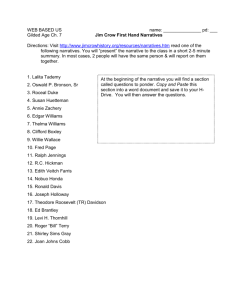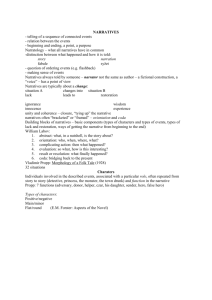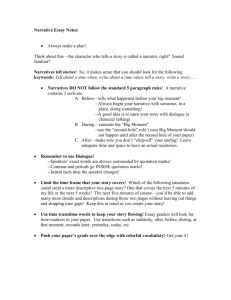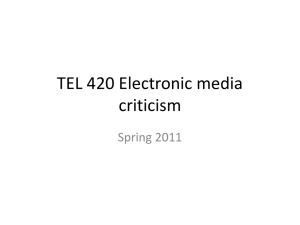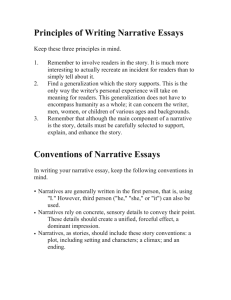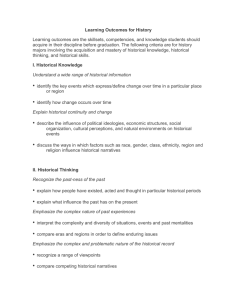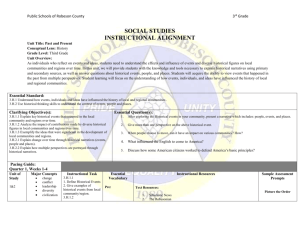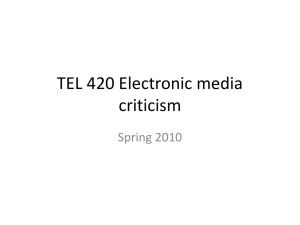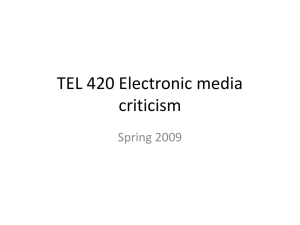File - Mr. Nurre's English Courses
advertisement
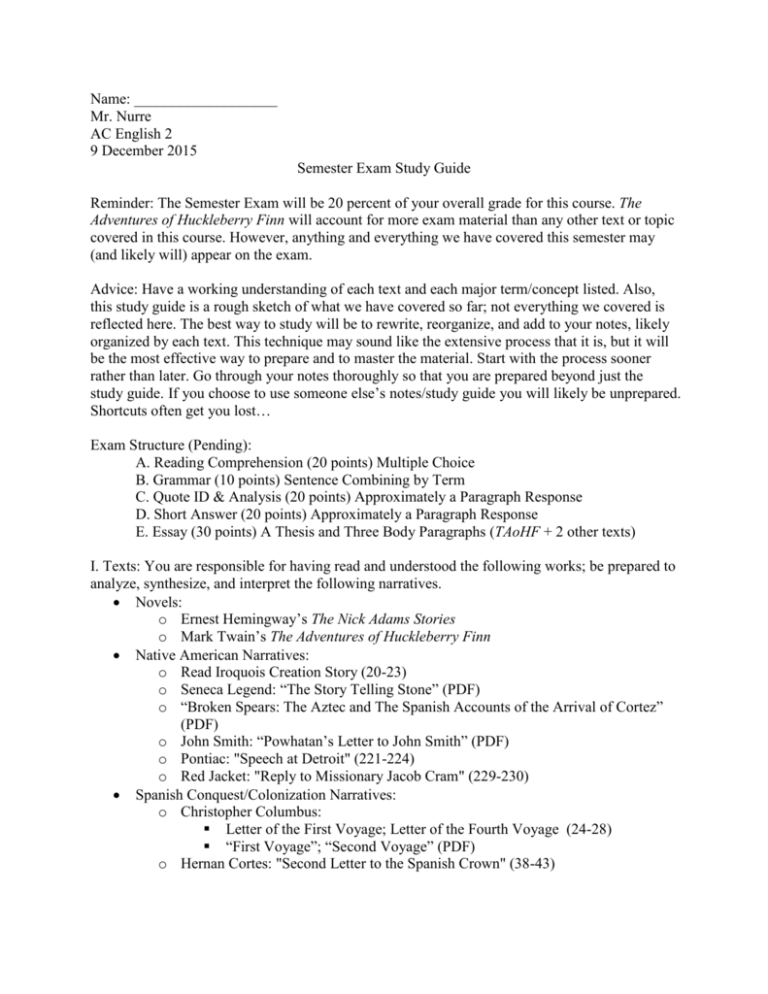
Name: ___________________ Mr. Nurre AC English 2 9 December 2015 Semester Exam Study Guide Reminder: The Semester Exam will be 20 percent of your overall grade for this course. The Adventures of Huckleberry Finn will account for more exam material than any other text or topic covered in this course. However, anything and everything we have covered this semester may (and likely will) appear on the exam. Advice: Have a working understanding of each text and each major term/concept listed. Also, this study guide is a rough sketch of what we have covered so far; not everything we covered is reflected here. The best way to study will be to rewrite, reorganize, and add to your notes, likely organized by each text. This technique may sound like the extensive process that it is, but it will be the most effective way to prepare and to master the material. Start with the process sooner rather than later. Go through your notes thoroughly so that you are prepared beyond just the study guide. If you choose to use someone else’s notes/study guide you will likely be unprepared. Shortcuts often get you lost… Exam Structure (Pending): A. Reading Comprehension (20 points) Multiple Choice B. Grammar (10 points) Sentence Combining by Term C. Quote ID & Analysis (20 points) Approximately a Paragraph Response D. Short Answer (20 points) Approximately a Paragraph Response E. Essay (30 points) A Thesis and Three Body Paragraphs (TAoHF + 2 other texts) I. Texts: You are responsible for having read and understood the following works; be prepared to analyze, synthesize, and interpret the following narratives. Novels: o Ernest Hemingway’s The Nick Adams Stories o Mark Twain’s The Adventures of Huckleberry Finn Native American Narratives: o Read Iroquois Creation Story (20-23) o Seneca Legend: “The Story Telling Stone” (PDF) o “Broken Spears: The Aztec and The Spanish Accounts of the Arrival of Cortez” (PDF) o John Smith: “Powhatan’s Letter to John Smith” (PDF) o Pontiac: "Speech at Detroit" (221-224) o Red Jacket: "Reply to Missionary Jacob Cram" (229-230) Spanish Conquest/Colonization Narratives: o Christopher Columbus: Letter of the First Voyage; Letter of the Fourth Voyage (24-28) “First Voyage”; “Second Voyage” (PDF) o Hernan Cortes: "Second Letter to the Spanish Crown" (38-43) English Conquest/Colonization Narratives: o Thomas Harriot: “A Brief and True Report of the New Found Land of Virginia” (PDF) o John Smith: "The General History of Virginia, New England, and the Summer Isles" (57-68) "Description of New England" (69-72) o William Bradford: “Of Plymouth Plantation” (72-73, 81-86, 89-90) o John Winthrop: “A Model of Christian Charity” (99-102) o Roger Williams: "The Bloody Tenet of Persecution" "Letter to Providence" (102-103, 107-109) o Anne Bradstreet: “The Prologue” (95-98) “Burning of Our House” (101-102) o Jonathan Edwards: "Sinners in the Hands of an Angry God" (209-220) Revolutionary Era Narratives: o Phyllis Wheatley: "On Being Brought from Africa to America" (401-2, 403) "On the Death of the Rev. George Whitefield" (405-6) o Benjamin Franklin: “Part Two: Continuation of the Account of My Life” from Autobiography (297- 308) “Information to Those Who Would Remove to America” (PDF) "Remarks Concerning the Savages of North America" (244-7) o Thomas Paine: Common Sense (323-331) o Thomas Jefferson: “The Declaration of Independence” (339-344) o Michel-Guillaume Jean de Crevecoeur's "Letter IX" (319-323) o Gustavas Vassa: “The Interesting Narrative of the Life of Oloudah Eqiuano (354355, 357-366) Post-Independence Narratives: o Washington Irving: “Rip Van Winkle” (470-481) “The Legend of Sleepy Hollow” (PDF) o Edgar Allan Poe: “The Cask of Amontillado” (PDF) “The Raven” (688-690) o Nathaniel Hawthorne: “Young Goodman Brown” (619-628) “Wakefield” (PDF) Historical/Introduction Sections: (Recommended) o Beginnings to 1700 (3-18) o American Literature 1700-1820 (157-168) o American Literature 1820-1865 (445-464) o Slavery, Race, and the Making of American Literature (761-778) o American Literature 1865-1914 (1265-1279) II. Major Concepts: Consider how each of these factor into the various texts we have read. Be prepared to discuss these ideas in short answer and essay questions; be prepared to compare multiple stories based on the ways they deal with one or more of these concepts. Gender: The Role of Women at Various Stages of American Literature Race: Native-White Relations over Time; Black-White Relations over Time Politics: Early Government to Civil War Era Cultural Conflict/Development: New World-Old World Relationships Religion: Catholic/Anglican Missionaries, Puritans, Revivalists, Shaping Literature and Cultural Life, Race Relations/Abolitionist Movement; Temperance Movement Power: Government, Religion, Economy and Social Status Language and Narrative: American Literature and Literary Style Economics: Capitalism, Labor, and American “Growth”; tension between seeking profit and protecting humanity; “self-preservation” Ideology/Ideological Formation: nature and function of ideology; ideological formations in terms of origins and developments; cultural influences, cultural values and ideals, cultural realities Pastoral Ideal: how each text engages with this idea and uses it to suit their objectives III. Major Terms and Ideas: Consider these major terms and ideas and the way they appear in the stories we have read and discussed. Consider how these terms connect to the Major Concepts or other major terms. CONSIDER: This list is only a brief overview; you are responsible for any other underlined/boxed terms that appeared on the board (and in your notes) at some point this semester. Do not limit your preparation solely to this list. Southern Ideology (Benefits and Drawbacks) Northern Ideology (Benefits and Drawbacks) Racist and Racialized Rhetoric Noble/Brutal Savage Depictions of African-Americans/slaves Pastoral Ideal Humanity (Full Spectrum) Democracy and Democratic Ideals Freedom Polemics Pathos Ethos Logos Argumentative Efficacy Brutality/Violence Independence Work/Labor Education/Intellectualism The Other Zeitgeist Mood/Tone Role of Nature Progress: Social and/or Individual Maturation Hero’s Journey Travel Narrative Function of Power Truth Revenge Revelry Sorrow Cultural Trauma The Role of Place: Home v. Migration Interpersonal Social Relationships Social Relationships Spirit of Independence v. Social Necessity/Obligation IV. Writing and Grammar: You should know the definitions and function of the following terms. You should be able to identify problems like previous assignments and tests. Sentence Composing for High School: o Skill 1: The Appositive Phrase o Skill 2: The Participial Phrase o Skill 3: The Absolute Phrase o Skill 4: The Prepositional Phrase Writing Basics: Thesis Statement Introductory Paragraph Structure Body Paragraph Structure Using Evidence Argument and Analysis Conclusion Structure MLA Formatting

